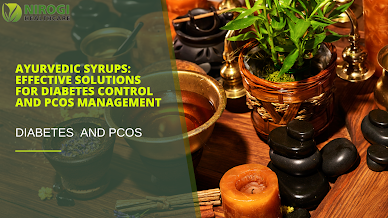Ayurvedic Syrups: Effective Solutions for Diabetes Control and PCOS Management
In recent years, there has been a growing interest in
natural and holistic approaches to healthcare. Ayurveda, the ancient Indian
system of medicine, has gained significant recognition worldwide for its
emphasis on balance and prevention. One area where Ayurveda has shown promising
results is in the management of chronic conditions like diabetes and polycystic
ovary syndrome (PCOS). In this article, we will explore the benefits of
Ayurvedic syrups for diabetes control and PCOS management.
Ayurvedic Syrups for
Diabetes Control:
Diabetes is a metabolic disorder that affects millions of
people globally. While conventional medicine offers various treatments, many
individuals seek alternative options to complement their diabetes management
plan. Ayurveda offers a holistic approach by addressing the root causes of the
condition.
Ayurvedic syrups formulated for diabetes control are
typically crafted using a blend of potent herbs and natural ingredients. These
syrups are designed to regulate blood sugar levels, enhance insulin
sensitivity, and support pancreatic function. Key ingredients often found in Ayurvedic diabetes control syrups
include bitter melon (Momordica charantia), fenugreek (Trigonella
foenum-graecum), gudmar (Gymnema sylvestre), and neem (Azadirachta indica).
Bitter melon, for example, has been extensively studied for
its hypoglycemic properties, which help reduce blood sugar levels. Fenugreek,
on the other hand, aids in glucose metabolism and may improve insulin
resistance. Gudmar is known as the "sugar destroyer" in Ayurveda and
has shown potential in reducing sugar cravings. Neem, a powerful herb, supports
blood purification and helps maintain healthy blood sugar levels.
Ayurvedic Syrups for
PCOS Management:
Polycystic ovary syndrome (PCOS) is a hormonal disorder that
affects women of reproductive age. It can lead to irregular periods, hormonal
imbalances, and difficulty conceiving. While PCOS cannot be cured, its symptoms
can be effectively managed through a comprehensive approach that includes lifestyle
changes, diet modifications, and natural remedies.
Ayurvedic syrups formulated for PCOS management are often
crafted using herbs and ingredients that help regulate hormonal imbalances and
support reproductive health. Some common ingredients found in these syrups
include Shatavari (Asparagus racemosus), Ashoka (Saraca indica), Lodhra
(Symplocos racemosa), and Gokshura (Tribulus terrestris).
Shatavari is renowned for its hormonal balancing properties
and is often used to support reproductive health in women. Ashoka and Lodhra
are known for their benefits in managing menstrual irregularities and
supporting a healthy uterine environment. Gokshura, on the other hand, may aid
in maintaining hormonal balance and promoting overall well-being.
The Importance of
Ayurvedic Approach:
Ayurvedic syrups for diabetes control and syrup for pcos management
offer a holistic approach that considers an individual's unique constitution
and imbalances. They aim to restore balance in the body, which is a key
principle of Ayurveda. By addressing the underlying causes rather than merely
treating symptoms, Ayurvedic syrups can provide long-lasting benefits.
It is important to note that Ayurvedic syrups should be used
as part of a comprehensive treatment plan, which may include dietary
modifications, exercise, stress management techniques, and regular medical
check-ups. It is always advisable to consult with a qualified Ayurvedic
practitioner or healthcare professional before incorporating any new treatment
or supplement.
Ayurvedic syrups have shown promise in the management of
chronic conditions like diabetes and PCOS. These syrups, formulated with a
blend of natural ingredients, can support blood sugar control, enhance hormonal
balance, and promote overall well-being. However, it is essential to adopt a
comprehensive approach to healthcare and consult with experts to ensure
personalized treatment plans. With the right guidance and commitment, Ayurvedic
syrups can be valuable additions to a holistic wellness journey.


Comments
Post a Comment